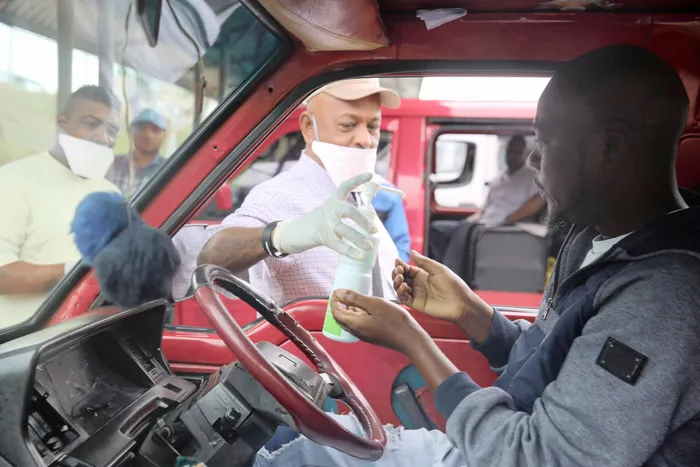Coronavirus: SA at higher risk because of people's weakened immune system

Taxi drivers and owners, Dollars Chetty, above, and Eyez Govender, far left, sanitise the hands of taxi driver Sbongiseni Mkhize at the Chatsworth taxi rank. NQOBILE MBONAMBI African News Agency (ANA) Taxi drivers and owners, Dollars Chetty, above, and Eyez Govender, far left, sanitise the hands of taxi driver Sbongiseni Mkhize at the Chatsworth taxi rank. NQOBILE MBONAMBI African News Agency (ANA)
Durban - CORONAVIRUS could kill more people in South Africa than in other countries because so many citizens have weakened immune systems.
High-risk individuals include those living with HIV/Aids, tuberculosis (TB), diabetes, cardiovascular disease and respiratory diseases like asthma. Also under increased risk are patients with cancer (in particular those who have been for chemotherapy or radiation treatment), the elderly and smokers.
With over 100 countries having confirmed cases of Covid-19, it has become clear the aged are most at risk, most likely because their immune systems are weak.
According to data from China, about 15% of those over the age of 80 who contracted the virus died. Less than 1% of those below the age of 50 who contracted the virus died. Children seem to be least at risk.
Smokers are also at a higher risk because smoking damages the lungs and also weakens the immune system.
Professor Mosa Moshabela confirmed those with a weakened immune system were a higher risk if they contracted the virus. He is the dean and Head of School: Nursing and
Public Health at the University of KwaZulu-Natal.
“If these people get Covid-19, it will be harder for their bodies to fight off the virus. The healthier people will find the virus to be more mild because their immune system can handle it. But those with a low immune system are the ones we need to worry about.
“If the elderly get infected, they can find themselves in the intensive care unit. However, the more the elderly get infected the harder it will be for our healthcare system to cope.”
“It is best to be aware of what is happening and take preventative measures now. We need to avoid going out and to take all the precautions President Cyril Ramaphosa spoke about, including washing hands frequently with soap and water. If they (those with weakened immune systems) get the virus we are doomed. We cannot allow them to get infected.”
He added that younger people should realise they could transmit the virus to the elderly.
Professor Wolfgang Preiser agreed the elderly and others with a weakened immune system were most at risk.
He is the head of the Division of Medical Virology at Stellenbosch University’s Faculty of Medicine and Health Sciences.
He added that, thus far, affected countries had a lower rate of HIV/Aids than South Africa.
“I have not seen any specific figures, however it needs to be assumed that if you have HIV, or TB, or any other chronic illness, your risk of severe coronavirus disease is increased.
“Those with diabetes have a high risk of severe disease and even dying, and one must fear that this might be similar for those conditions, too.”
He said with the influenza season starting in May and ending in September, one could speculate the virus would spread easily.
“Many respiratory infections, like influenza, occur more commonly in the colder season. So, it could be that this is why some northern hemisphere countries (like India and China) currently in winter are worse affected. And maybe they will then get a reprieve until the next winter starts.”
Preiser said it would be useful for high-risk people (elderly and the chronically ill) to get the annual influenza vaccine shot this year.
“Healthcare facilities are expected to be under severe strain. The fewer flu cases the better. Should someone get both together, especially if they belong to one of the risk groups, it would likely cause serious illness. And last but not least, the two diseases are very similar in the way they present. So, one could have influenza but be suspected of having the coronaviruses, and be put in isolation while being tested, etc.”
Dr Ozayr Mahomed, a preventive medicine specialist at UKZN who studied epidemiology, warned that while the fatality rate was about 4% worldwide, it could be worse in South Africa.
“At the moment we don’t know. All we can do is speculate. This is a new virus and everything is changing daily. We are working with figures from an already developed world country. Here we do have people with TB, cancer and respiratory problems.
“However, to say what the fatality rate would be or if it would increase is too soon. It could be anything between 10% and 20% but it’s still too soon to say.”
However, Dr Moosa Suleman, a pulmonologist at Ahmed Al-Kadi Hospital, urged people not to panic.
“What we need to understand is that 80% of the people who would be affected would be fine, it would feel a little like the common cold. For the 20%, who would be more elderly they would find it a little harder to recover because of their low-immune systems.